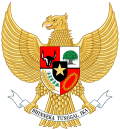First Ali Sastroamidjojo Cabinet Kabinet Ali Sastroamidjojo I | |
|---|---|
| 15th Cabinet of Indonesia | |
| 1953–1955 | |
 | |
| Date formed | 30 July 1953 |
| Date dissolved | 12 August 1955 |
| People and organisations | |
| Head of state | Sukarno |
| Head of government | Ali Sastroamidjojo |
| No. of ministers | 20 ministers |
| Member party | PNI Masyumi PSII Catholic PIR Labour Parkindo Independent |
| Opposition party | Masyumi |
| History | |
| Predecessor | Wilopo Cabinet |
| Successor | Burhanuddin Harahap Cabinet |
| ||
|---|---|---|
Pre-independence Domestic policy Foreign policy Family Media and legacy | ||
The First Ali Sastroamidjojo Cabinet [1] (Indonesian : Kabinet Ali Sastroamidjojo I) was an Indonesian cabinet named after the prime minister, and also known as 'Kabinet IV', that served from 30 July 1953 until 12 August 1955.

